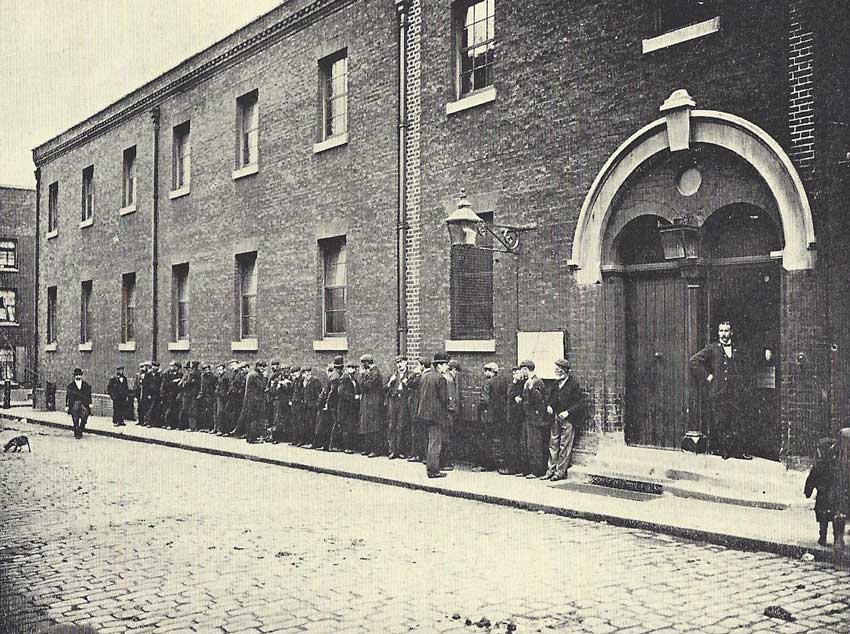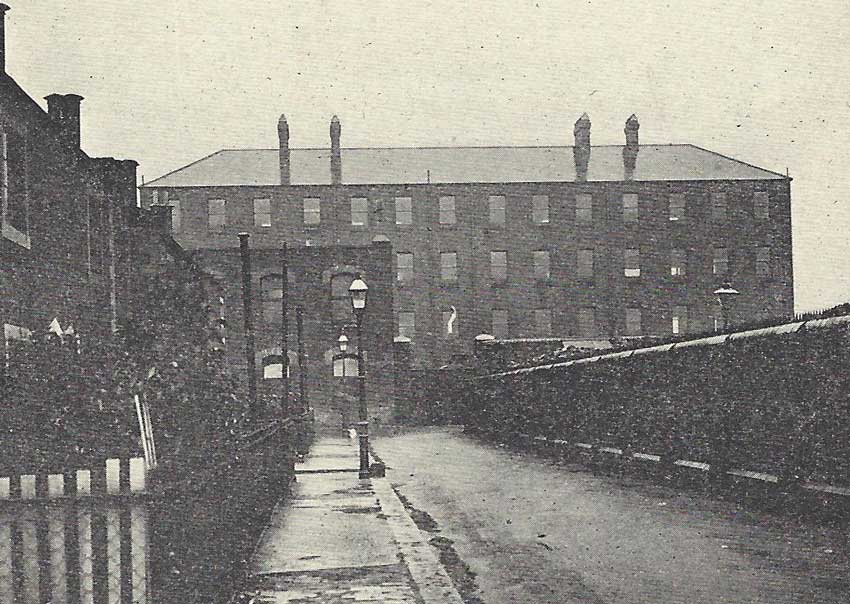Although the Victorian era is often portrayed as being one of endless possibilities, as Britain surged ahead of the rest of the World as an industrial and financial powerhouse, this expansion came at a cost.
Indeed, more than ever before it became apparent that, as vast numbers of people were leading lives of increased wealth and privilege, a vast underclass found itself left behind, and poverty became a subject that truly troubled a large section of the privileged class.
From the 1830s onward, writers, such as Charles Dickens, had been warning that society ignored the growing gulf between the rich and the poor at its peril.
The Patriot, in its edition of Monday the 17th of December, 1855, published the following article on the subject:-
CONDITION OF THE POOR
In society there must of necessity exist several phases; men must be superior or inferior in education, richer or poorer as regards this world’s goods.
However well we may carry out the first two conditions of the Revolutionary cry, “Liberty, Fraternity, and Equality,” the magic tria juncta in uno, we are unable to adjust the third.
It is impossible that all men should have an equal share of the pecuniary ex- territorial substance of which the wealth of the whole world consists.
For, suppose it possible that, at one given moment, to every man should be allotted a broad acre, and should be distributed a well-filled purse, the very first necessity that any one man felt, and which he of himself could not relieve, would put that man in an inferior position to others. He would have to purchase the convenience which he required, and thus his capital would be decreased.
CHRISTIAN DUTY
But, how far do we fulfil the Christian duty of brotherhood?
For, seeing that poverty is a necessity, – a social evil which cannot be uprooted, – it behoves us to do our utmost to alleviate the sufferings of our poorer brethren, and to do this, not only on humane, but also on social grounds.
Our safety, our well-being, our happiness, our prosperity, all depend on the protection we afford to the poor, the outcast, and the wanderer.
CLASSES OF POVERTY
Poverty is not a crime.
But, of the wretched multitude, who are generally called poor, there are two distinct classes – those who are willing to work, but unable, either from physical inability or the want of employment; and those who are able to work, but are unwilling to do so.
The first of these two classes constitute the poor proper; the second consists of vagabonds and thieves.
It is for the former that the Poor Law provides; the latter come under the control of the magistrates and the police.
While, then, there is so great a distinction between the two classes which constitute, as one whole, the destitute in the land, that distinction, nevertheless, does not lead to discovery of the class to which each applicant for relief belongs.
So that, while, on the one hand, there is danger of refusing the shelter of a workhouse to those who stand in real need of it, and who have a claim upon it; yet, on the other hand, to bestow food and shelter on all applicants, is offering to those who are indisposed to work, as well as to those who are unable to work or unable to find employment, a sure supply of the necessaries of life, and a comfortable shelter from the inclemencies of weather; amounting, in fact, to an encouragement of idleness and vice.
THE POOR OF THE METROPOLIS
The workhouse, if properly managed, and if conducted with all the care and consideration that its officers are capable of manifesting, is the brake between poverty and crime.
Nemo repente fait turpissimus; and it is but too certain, that many of our fellow creatures are absolutely driven to commit either outrages on the public peace, in order to obtain lodgment in a prison, or theft to supply themselves with articles of food.
Surely never has there been a class of people more deserving of the public attention, whether as regards the morality of the Nation or the bestowment of charity, than the poor of this Metropolis.
TURNED AWAY FROM WHITECHAPEL WORKHOUSE
On Thursday last, application was made at the Worship-street Police-court, by some persons who had been refused assistance at Whitechapel Workhouse; one case, that of a man and his wife, the man almost blind, who had lived in the parish thirty-five years, and were unable to support themselves; another, an old journeyman weaver, who, after having been an inmate for three weeks, was summarily ejected.
The Board have, however, admitted the injustice of their proceedings, by re-admitting these persons, when Mr. Hammill sent a servant to represent their case to the Relieving Officer.

TEN HEALTHY FEMALES
On Friday, ten able-bodied, stout, and healthy young females were brought up at the Thames Police-court, charged with being disorderly and riotous in the Poplar Union Workhouse, of which they wee inmates.
It appears, that no one would accept the females as domestic servants, because the Guardians could not recommend them.
Mr. INGHAM, the sitting Magistrate, said: “Here are 10 young women, and many others in the workhouse, all able to earn their own living: and some of them have been in the workhouse almost ever since they were born. It is a most lamentable state of things. I am afraid that anything I say will not be attended to.
All these females are eating the bread of idleness, and are able to get their own living. No one will employ them; and it is a most terrible state of things. I convict the two ringleaders; I hope the others will take warning. They ought to obtain situations, and get their own living. They are kept by other people who work hard, and have great difficulty in paying their rates.”

REFUSED ADMISSION
But, leaving the consideration of those cases which arise within the workhouse, we would direct the attention of our readers to the far more lamentable appearance presented by those who, seeking admission at night, have it refused them, and are compelled to lie down on the stones, having no other curtain than the heavens.
We might particularise the instances of this nature which have, during the last week, come under our notice; but we invite any of our readers who are incredulous as to this dreadful and inhumane state of things, to pass by, at night, any one of these establishments; and he will, in almost every instance, find that the reality surpasses the description.
TOUCHY ON TAXES
The tax-gatherer is at all times an unwelcome visitor and, though we, as a people, complain not of paying the QUEEN’S taxes, yet, the local rates form no small percentage on our incomes.
We are particularly touchy when we are taxed on behalf of measures in which we do not participate, and are most carefully scrutinous that the money is properly applied.
Let us be equally so with regard to our parish rates.
We do not grumble at the amount; but we quarrel with the manner in which it is expended.
If there is not already sufficient accommodation, by all means let us have more.
We are not about to dictate what provision each should should make for the poor.
THE PROSPECT OF WINTER
The Irvingites, continuing a Jewish custom, devote one-tenth of their goods to this and such-like purposes; and, though, as a rule, indiscriminate almsgiving is bad, yet no precept is, throughout the New Testament, so strongly enjoined as that of charity.
With the prospect of a winter which has already given intimation of its near approach, and which has been predicted to be more severe than any we have had of recent years – with scarcity of employment, and with the present high prices of provisions before our eyes – it behoves each of us individually, and all of us collectively, to use our utmost exertions in alleviating the misery and distress consequent on poverty.
CAREFUL DISTRIBUTION
The present times demand that more than the usual amount of temporary relief should be afforded.
Let, however, our public resources be subject to the most rigid investigation, to insure the proper distribution of the funds raised for this object, and to make those funds cover as much as possible.
Let us not postpone any measures for the permanent relief of the poor, on the false plea of a present temporary necessity; but let individual exertions supply the existing want, till permanent measures can be decided on and carried into effect.
